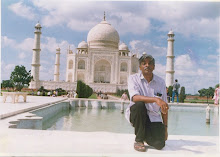Kerala once again hosted Indian Science Congress after two decades. The first was held in Kochi in 1990 and now the capital city of Kerala, Thiruvananthapuram became the host city with co-organizers of the meet were ISRO and Kerala University. Kerala University is the 16th University in India prevailing the model of Western Universities established by King of Travecnore in 1937.
97th Indian Science Congress ended on 7th January 2010. It was inaugurated on 3rd January 2010 by our Honorable Prime Minister Dr Manmohan Singh. In his inaugural address he expressed his concern over red-tapism, political interference and lack of proper recognition of good works have resulted in 'regression' in Indian Science. He urged the scientists to come out with suggestions to 'liberate Indian Science from from the shackles and dead-weight of bureaucratism and in-house favoritism'. He aptly pointed out that '..scientific capability is what will determine our ability to overcome the challenges which lie ahead'. He also noted that centre has declared 2010-2020 as the 'Decade of Innovations' to produce newer solutions to meet the needs of the society. He also pointed out that 'we need to concentrate on strengthening the linkages between academia, research and Industry. Today, each operates within its own silo. Unless we close these gaps, our research and development sector may report high performance in terms of published papers, but our challenges of the 21st century will remain unsolved.' The function was Chaired by Dr G Madhavan Nair, General President of Indian Science Congress and former Chairman, ISRO.
He also called for special efforts to encourage scientists of Indian origin working abroad to either return to India or visit Indian Universities and scientific Institutions for short periods inorder to combat brain drain.
About 7000 delegates including 2000 students from different parts of the country participated in the meet and 2000 scientific and technical papers presented in 97th Science congress and discussed about food and energy security, global warming, water scarcity, challenges in health sector etc. The focal theme of the science congress was Science and Technology challenges of 21st century- National perspective.
Indian Science Congress Association(ISCA), as in the case of Indian National congress, was formed by the initiatives of two British Chemists, namely, by Prof: J L Simonsen and Prof; P S MacMahon, in line with the British Association for the Advancement of Science. The objective of the ISCA was 1.To advance and promote the cause of Science in India. 2. To hold an annul congress at a suitable place in India. 3. To publish proceedings, journals, transactions etc. 4, To popularize science.
The first meeting of the Indian Science Congress was held during 15-17 January 1914 at the premises of Asiatic Society, Calcutta. At that time the President of ISCA was Honorable Justice Sir Asutosh Mukherjee, the then Vice Chancellor of Calcutta University. In that meet 105 Scientists from different parts of India attended and 35 papers divided into six sections, namely, Botany, Chemistry, Ethnography, Geology, Physics, Zoology were discussed under six sectional Presidents. Now there are 14 sections. They are 1. Agriculture and forestry Sciences 2. Animal, Veterinary and Fishery Sciences 3. Anthropological and Behavioral Sciences(including Archeology) and Psychology &educational sciences 4. Chemical sciences. 5. Earth system sciences 6. Energy sciences. 7. Environmental sciences 8. Information Communication & Technology(including Computer science). 9. Material science 10. Mathematical sciences(including Statistics) 11. Medical sciences(including physiology) 12. New biology(including Biochemistry, Biophysics , Molecular Biology and biotechnology). 13 Physical sciences and14. a committee on Science and society.
The silver jubilee of SCA was held in 1938 at Calcutta under the president ship of Lord Lutherford of Nelson but due to his sudden demise the chair was took over by Sir James Jeens. From this annual meet on wards foreign scientists took part in Indian Science congress.
Golden Jubilee of ISCA was held in 1963 at Delhi with Prof: D S Kothari as General president.
Diamond Jubilee was held at Chandigarh in 1973 under the President ship of Dr S Bhagavantam.
Platinum jubilee was held in 1988 under the President ship of Prof C N R Rao.
In 1976 Dr M S Swaminathan, the then General president of ISCA introduced the concept of focal theme of national relevance, which is now discussed in every section, committee and forum during the annual section
Another significant breakthrough was made in 1980 when DST,Government of India set up a permanent Task Force involving representation of ISCA and chiefs of different agencies and voluntary agencies chaired by Secretary,DST as being responsible for following up various recommendations of Focal Theme
Next Indian science Congress will be held at Chennai.
ktv
In 1976 Dr M S Swaminathan, the then General president of ISCA introduced the concept of focal theme of national relevance, which is now discussed in every section, committee and forum during the annual section
Another significant breakthrough was made in 1980 when DST,Government of India set up a permanent Task Force involving representation of ISCA and chiefs of different agencies and voluntary agencies chaired by Secretary,DST as being responsible for following up various recommendations of Focal Theme
Next Indian science Congress will be held at Chennai.
ktv

No comments:
Post a Comment